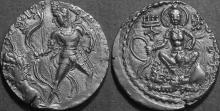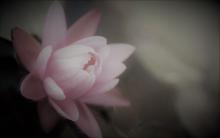(Karmayoga)
yajñārthāt karmaṇo ’nyatra loko’yaṃ ।
karma-bandhana iti jānīhi satyam ॥
karma-phalāsaṅgaṃ tyaktvaiva santṛptaḥ ।
karma kurvannapi kartā sa naiva ॥ 13 ॥
Know the truth, that karma is shackling
Unless performed as yajña for the world’s well-being.
One who is satisfied, and gives up the desire for the fruit of karma
Even when he is engaged in it, he is never the kartā.
Author:hari
ಡಿ.ವಿ.ಜಿ. ಅವರು ಹೇಗೆ ಪತ್ರಕರ್ತರಿಗೊಂದು ಮುಗಿಲೆತ್ತರದ ಮಾದರಿಯಾಗಿ ಬೆಳೆದಿದ್ದರೋ ವ್ಯಕ್ತಿಚಿತ್ರಲೇಖನಕ್ಕೆ ಆದರ್ಶವಾಗಿ ಬೆಳಗಿದ್ದರೋ ವೈದುಷ್ಯದ ಸಮಗ್ರತೆಗೆ ಸಂಕೇತವಾಗಿ ನಿಂತಿದ್ದರೋ ಹಾಗೆಯೇ ಅವರ ಪ್ರಿಯಶಿಷ್ಯ ಎಸ್. ಆರ್. ರಾಮಸ್ವಾಮಿ ಅವರು ನಮ್ಮ ನಡುವೆ ನೆಲಸಿದ್ದಾರೆ. ಕವಿತೆ, ರೂಪಕ, ವೇದಾಂತ ಮೊದಲಾದ ಕೆಲವು ಸಾಹಿತ್ಯಪ್ರಕಾರಗಳಲ್ಲಿ ಡಿ.ವಿ.ಜಿ. ಅವರಂತೆ ರಾಮಸ್ವಾಮಿಯವರು ಕೃತಿರಚನೆ ಮಾಡಿಲ್ಲದಿದ್ದರೂ ಅಂಥ ವಾಙ್ಮಯನಿರ್ಮಿತಿಗೆ ಬೇಕಾದ ಒಳ-ಹೊರಗಿನ ಸಿದ್ಧತೆಗಳನ್ನೆಲ್ಲ ಮಾಡಿಕೊಂಡೇ ಇದ್ದವರು; ಅವುಗಳನ್ನು ನಿರಂತರವಾಗಿ ಆಸ್ವಾದಿಸಿ ಅನುಸಂಧಾನಿಸುತ್ತ ಬಂದವರು. ಇದೇ ರೀತಿ ಡಿ.ವಿ.ಜಿ.
Sten Knonow, however, opines that Śūdraka must have been another name for the king of ābhīras called Śiva-datta and this king is known to have lived in the third century CE. The primary evidence he draws to support his argument is the fact that in the play, we see a character named Āryaka, the son of Gopāla, eventually replacing King Pālaka on the throne. The ābhīras were cowherds (gopālas) and thus, the conclusion drawn by Sten Knonow. This does not sound reasonable.
यही विशेषता हम वाल्मीकि तथा व्यास में भि देखते है – राम ने जिस तरह वाली को मारा था अथवा सीता का त्याग किया था, उसके बाद भी वे सम्मान के प्रतीक बने,रणभूमी में घटोत्कच के मारे जाने पर कृष्ण का खुशी से ताली बजाकर नाचने पर भी उन्हे पूजनीय मानना आदि ऐसे उदाहरण है जहां हमारे महापुरुषों का व्यवहार सामान्य सर्वमान्य मन्यतों से थोडा विचलित है और जिसे सुखद नही कहा जा सकता है, यह स्पष्ट करता है कि मात्र कुछ अरुचिकर कृत्यों के कारण किसी व्यक्ति को पूर्णतः अयोग्य मानना न केवल मूर्खतापूर्ण है अपितु दुर्भावनपूर्ण भी है |
itthaṃ rāmāyaṇe dṛśyā gītā-tātparya-mūrtayaḥ ।
īśa-prītyā loka-saṃsthā-kṣemārthaṃ datta-jīvitāḥ ॥11॥The personification of the Gītā’s teachings are thus seen in the Rāmāyaṇa; they surrendered their lives for the love of Īśvara and for the sustenance of the world.
yathā vasante taravaḥ sva-svajātyaiḥ sumaiḥ phalaiḥ ।
śobhante tatvad-evāmī sva-sva-sattva-guṇodgamaiḥ ॥ 12॥
Vanitākavitotsavaḥ is a unique Sanskrit play written by Śatāvadhānī Dr. R Ganesh, an eminent contemporary poet. As the title indicates, it is a celebration of poetry composed by women. This work was first written around thirty years ago and was then published in Saṃskṛta-pratibhā, a quarterly journal brought out by Sahitya Akademi. It was recently revised and published as a book.[1]
It is hard to say when and where Śūdraka was born. The following verses that occur at the beginning of his play, the Mṛcchakaṭika, provide us with some details about the playwright –
Dviradendra-gatiścakora-netraḥ pari-pūrṇendu-mukhaḥ suvigrahaśca |
Dvija-mukhyatamaḥ kavirbabhūva prathitaḥ śūdraka ityagādha-sattvaḥ ||
ṛg-vedaṃ sāma-vedaṃ gaṇitam-atha kalāṃ vaiśikiṃ hasti-śikṣāṃ
jñātvā śarva-prasādād-vyapagata-timire cakṣuṣī copalabhya |
Was dharma established?
When Arjuna said he would not fight, what did Svāmi say? He said, “I stand for upholding dharma. This war is for the sake of that. This war will not end if you do not fight. Before you could even think of it, I have already destroyed those who were against dharma” (“mayaivaite nihatāh pūrvameva ।)” — 11.33









